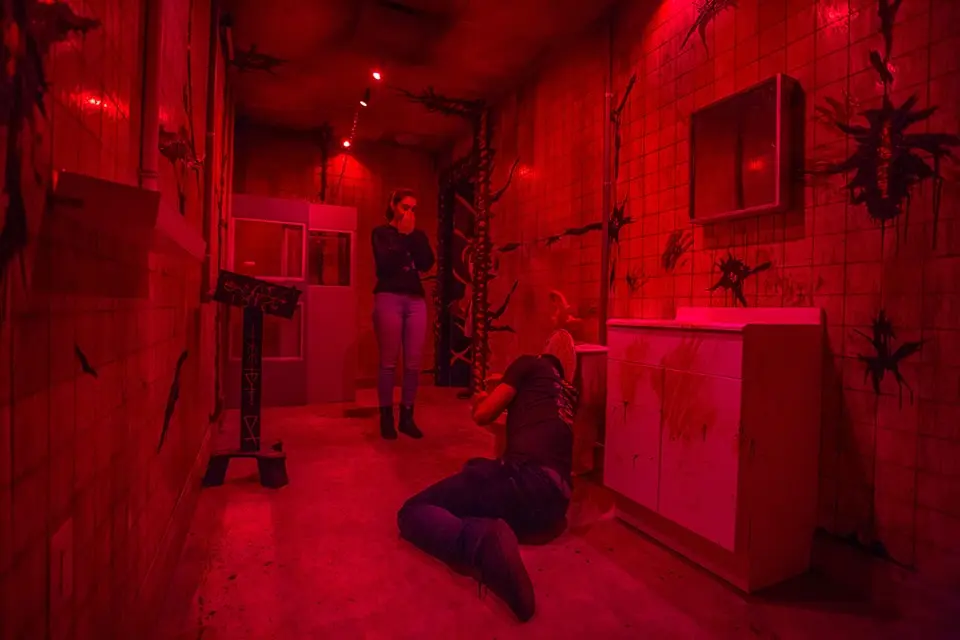Opening the Educational Conveniences of Escape Room Difficulties
Including retreat space obstacles into academic frameworks provides a special chance to improve essential thinking, advertise synergy, and establish analytical abilities among trainees. By merging entertainment with education and learning, escape areas not just boost pupil involvement but likewise prepare them for future obstacles, needing durability and collaboration.
Enhancing Critical Believing
Retreat room obstacles work as a appealing and dynamic device for enhancing vital thinking skills. These immersive experiences call for participants to resolve a collection of challenges and puzzles within an established duration, fostering an atmosphere where cognitive abilities are rigorously examined and established. The nature of retreat rooms requires an organized technique to analytic, encouraging individuals to assess details critically, identify patterns, and attract logical final thoughts.
Participants in escape space difficulties are usually confronted with complex problems that need ingenious options, thereby advertising side thinking. This type of thinking is necessary for recognizing links between relatively unconnected principles and for creating imaginative options. In addition, the stress of a ticking clock includes a component of urgency, pushing participants to think both rapidly and properly.
Moreover, escape room challenges frequently integrate a range of challenges that attract different cognitive staminas, such as rational reasoning, spatial awareness, and mathematical skills. This variety ensures that participants exercise a wide variety of psychological professors, which is crucial to detailed cognitive advancement. Essentially, escape rooms develop a revitalizing atmosphere that not only captivates but also grows necessary crucial thinking capacities, making them a useful academic tool.
Promoting Teamwork
Interacting efficiently is a vital element of success in retreat space challenges, as these activities inherently require collaboration amongst participants. The structured environment of a getaway room demands that people pool their varied skills, expertise, and viewpoints to fix complex issues within a limited duration. This collective approach cultivates an understanding of the significance of each group participant's contributions, consequently enhancing social skills and mutual regard.
In an instructional context, getaway areas work as a dynamic platform for advertising teamwork amongst students. By involving in these obstacles, trainees find out to interact more efficiently, delegate jobs based upon private strengths, and support each other under pressure - orlando escape room. These experiences convert into enhanced team characteristics in classroom setups, where participating learning is vital for scholastic success
Furthermore, the interactive and immersive nature of retreat rooms offers a sensible, hands-on experience that reinforces theoretical ideas connected to teamwork. It enables individuals to exercise and fine-tune crucial soft skills, such as management, energetic listening, and dispute resolution. As a result, retreat room challenges not just make learning delightful yet additionally prepare students for future real-world situations where synergy is essential.
Establishing Problem-Solving Skills
Establishing analytical abilities via retreat area challenges offers a special and appealing method for refining essential assuming capacities. These interactive atmospheres existing participants with a series of intricate problems and scenarios that require innovative and logical approaches to solve. By browsing these difficulties, individuals are forced to think outside package, adjust rapidly to More Bonuses brand-new information, and use rational reasoning in real-time.

The hands-on nature of escape room challenges cultivates a sense of necessity and exhilaration, which can dramatically enhance pupil motivation. They are much more most likely to invest initiative and interest right into the learning tasks when pupils are engaged in a story that requires them to resolve problems and overcome barriers. This enhanced involvement can lead to deeper understanding and retention of the product, as pupils are required to apply their expertise in real-time scenarios.
In addition, the joint facet of getaway spaces promotes team effort and interaction skills. Integrating escape area obstacles into instructional settings can be an effective method to boost trainee interaction and drive academic achievement.
Conclusion

Incorporating getaway room obstacles into educational structures provides a special opportunity to boost important thinking, find more information promote teamwork, and create analytical abilities among students. As an outcome, getaway room tests not just make discovering enjoyable but additionally prepare students for future real-world circumstances where teamwork is crucial.
Involving students in the understanding process is important for academic success, and get away room obstacles provide an engaging solution to this academic crucial. Integrating retreat space challenges right into instructional settings can be an effective strategy to elevate trainee involvement and drive scholastic achievement.
The dynamic nature of getaway areas effectively furnishes students with necessary abilities for academic and real-world success, eventually enhancing the instructional experience and preparing learners for future challenges.